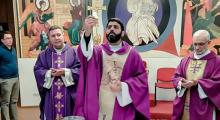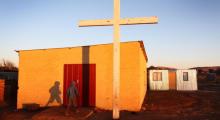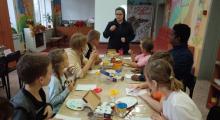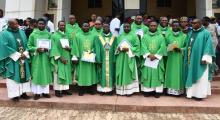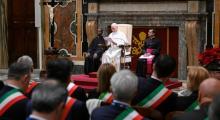Issued by the Catholic Center for Studies and Media - Jordan. Editor-in-chief Fr. Rif'at Bader - موقع أبونا abouna.org
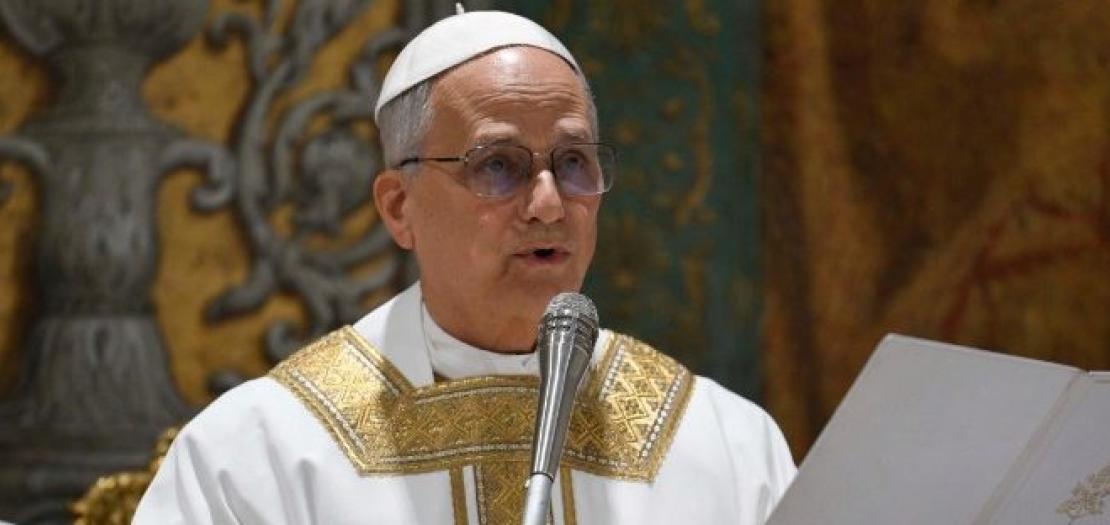
"We are called to bear witness to our joyful faith in Christ the Saviour..."
Pope Leo XIV gave this heartfelt reminder during his first Mass as Pope on Friday, 9 May 2025, with the Cardinal electors and other Cardinals present in Rome, in the Sistine Chapel, the exact site where the electors, with at least a two-thirds majority, elected him as the 267th Pope on the fourth ballot on Thursday afternoon.
In his homily, the new Pope called for always better cultivating a personal relationship with Christ; and he insisted that, without faith, life lacks meaning.
However, the new US-born Pope began with a few words in English, in which he thanked the Cardinal electors for their trust in him.
"I want to repeat the words from the Responsorial Psalm: 'I will sing a new song to the Lord, because He has done marvels,' and indeed, not just with me but with all of us.
"My brother Cardinals, as we celebrate this morning," he encouraged them, "I invite you to reflect on the marvels the Lord has done, the blessings that the Lord continues to pour out on all of us through the Ministry of Peter.
"You have called me to carry that cross, and to carry out that mission, and I know I can rely on each and every one of you to walk with me, as we continue as a Church, as a community of friends of Jesus, as believers, to announce the Good News, to announce the Gospel," he said.
Christ showed us human holiness
Pope Leo's homily, which he then pronounced in Italian, was centered on St. Peter, the first Pope, recalling his words in the Gospel according to St. Matthew: "You are the Christ, the Son of the living God," in order to illustrate that patrimony, made possible by persistent faith in the Lord, "that the Church, through the apostolic succession, has preserved, deepened and handed on for two thousand years."
Reflecting on Peter's relationship with Christ, the Pope recalled that Jesus, our Saviour, alone reveals the face of the Father.
"In Him, God, in order to make Himself close and accessible to men and women," he underscored, "revealed Himself to us in the trusting eyes of a child, in the lively mind of a young person and in the mature features of a man, finally appearing to His disciples after the Resurrection with His glorious body."
In this way, the Pope said, "He showed us a model of human holiness that we can all imitate, together with the promise of an eternal destiny that transcends all our limits and abilities."
“Jesus showed us a model of human holiness that we can all imitate, together with the promise of an eternal destiny that transcends all our limits and abilities.”
A gift and a path
The Pope noted that Peter, in his response, understands that it is both "a gift of God" as well as "the path to follow in order to allow himself to be changed by that gift," and affirmed that "they are inseparable aspects of salvation entrusted to the Church to be proclaimed for the good of the human race."
"Indeed," Pope Leo XIV marveled, "they are entrusted to us, who were chosen by Him before we were formed in our mothers’ wombs, reborn in the waters of Baptism and, surpassing our limitations and with no merit of our own, brought here and sent forth from here, so that the Gospel might be proclaimed to every creature."
Called me to be faithful for the Church
The new Pope recalled that God called him, with his election as the 267th Pope yesterday afternoon, to succeed Peter, and, as such, "has entrusted this treasure to me so that, with his help, I may be its faithful administrator for the sake of the entire mystical Body of the Church."
Yet, Peter, the Pope remembered, makes his profession of faith in reply to a specific question, 'Who do people say that the Son of Man is?”'
This question, Pope Leo highlighted, is not insignificant and concerns "an essential aspect of our ministry, namely, the world in which we live, with its limitations and its potential, its questions and its convictions."
Two different attitudes
“Who do people say that the Son of Man is?” the new Holy Father repeated, noting, "If we reflect on the scene we are considering, we might find two possible answers, which characterize two different attitudes."
First, Pope Leo said, there was the response of the world, which "will not hesitate to reject and eliminate Him" once "His presence becomes irksome" also because of "His stern moral requirements."
Then there is the other possible response to Jesus’ question, that of ordinary people, who see Him "as an upright man of courage"; but to them "He is only a man, and therefore, in times of danger, during His passion, they too abandon Him and depart disappointed."
Missionary outreach needed where difficult to preach witness
What is striking about these two attitudes, the Pope said, is their relevance today, for, they, the Holy Father acknowledged, embody notions that we could easily find on the lips of many men and women in our own time, even if, while essentially identical, they are expressed in different language.
"Even today," he warned, "there are many settings in which the Christian faith is considered absurd, meant for the weak and unintelligent. Settings where other securities are preferred, like technology, money, success, power, or pleasure."
These are contexts, he highlighted, "where it is not easy to preach the Gospel and bear witness to its truth, where believers are mocked, opposed, despised or at best tolerated and pitied."
"Yet, precisely for this reason," he said, "they are the places where our missionary outreach is desperately needed."
Lack of faith accompanied by lack of meaning in life
"A lack of faith," Pope Leo underscored, "is often tragically accompanied by the loss of meaning in life, the neglect of mercy, appalling violations of human dignity, the crisis of the family and so many other wounds that afflict our society."
Today, he observed, "there are many settings in which Jesus, although appreciated as a man, is reduced to a kind of charismatic leader or superman."
Acknowledging this happens "not only among non-believers but also among many baptized Christians," Pope Leo warned that, as such, they "end up living, at this level, in a state of practical atheism."
With this in mind, Pope Leo reassured the congregation, "This is the world that has been entrusted to us, a world in which, as Pope Francis taught us so many times, we are called to bear witness to our joyful faith in Christ the Saviour."
"Therefore," he continued, "it is essential that we too repeat, with Peter: 'You are the Christ, the Son of the living God'.'"
Daily journey of conversion
He said it is essential to do this, first of all, in our personal relationship with the Lord, in our commitment to a "daily journey of conversion."
Then as a Church, we are to do the same, he reminded them, "experiencing together our fidelity to the Lord and bringing the Good News to all."
"I say this first of all to myself, as the Successor of Peter, as I begin my mission as Bishop of Rome," he expressed, sharing that he does so according to the well-known expression of Saint Ignatius of Antioch, "to preside in charity over the universal Church."
He recalled that "Saint Ignatius, who was led in chains to this city, the place of his impending sacrifice, wrote to the Christians there: 'Then I will truly be a disciple of Jesus Christ, when the world no longer sees my body.'”
Moving aside to make space for Christ
"Ignatius," Pope Leo explained, "was speaking about being devoured by wild beasts in the arena – and so it happened," he clarified, adding, "But, his words apply more generally to an indispensable commitment for all those in the Church who exercise a ministry of authority."
Specifically, he underscored, that commitment "is to move aside so that Christ may remain, to make oneself small so that he may be known and glorified, to spend oneself to the utmost so that all may have the opportunity to know and love Him."
Pope Leo XIV concluded his homily by praying, "May God grant me this grace, today and always, through the loving intercession of Mary, Mother of the Church."


